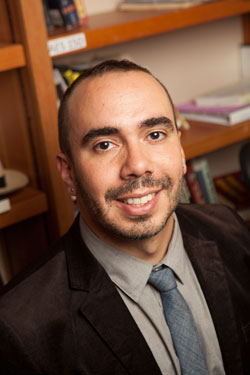In Roy Pérez’s fifth year as an undergrad at the University of Central Florida, the associate dean of the honors college called him into his office.
The dean asked Pérez if he had considered graduate school. He hadn’t, not even for a moment.
As a first-generation U.S. citizen and first-generation college student, Pérez says earning a PhD in the humanities seemed like too much of an economic risk.
“My family didn’t discourage me from pursuing anything I wanted to, but we just didn’t have access to any narratives about success in the arts or humanities,” he says.
But at the dean’s urging, Pérez explored a handful of programs.
Eight years later, with two graduate degrees in English in hand, Pérez joined the Willamette faculty. He now works as a professor of English and American Ethnic Studies (AES).
Through his work, Pérez is able to challenge concepts of culture and power and provide students with the narrative he sought for himself.
“Education in the humanities, for me, is about knowing which questions to ask and how to work with others to find and share possible answers,” he says.
“The kind of academic work I admire starts from a place of disquiet about something that’s up in the world, and snowballs into different kinds of engagement.”
Teaching at Willamette
Pérez teaches a variety of courses, ranging from “Intro to Creative Writing” and “Latino Countercultures,” to his 2014 College Colloquium, “Queer Drama: AIDS, Race and the Performance of Sexuality.” He is one of only two core professors who teach the core courses in the AES program, something he hopes to change in the future.
In his colloquium, Pérez and his students study the history of AIDS activism through performance, specifically paying attention to matters of race.
Pérez decided to teach about HIV/AIDS because he realized current college students do not know enough about it.
In class, he and his students read four primary plays and acted out some of their favorite scenes. Sometimes, they jumped on tables and flashed lights, such as when they performed “Millennium Approaches,” the first part of the prize-winning play “Angels in America: A Gay Fantasia on National Themes” by Tony Kushner.
Lauren White ’18, who’s taken a class with Pérez and continues to work with him as an advisee, says he’s given her the kind of help and guidance she can use throughout and after college.
“He is passionate about what he teaches and definitely opens his students’ eyes to the world around them,” she says. “Coming in as a freshman can be a difficult transition, but he made the best of it and helped us all develop into the students we are today.”
Life Outside Willamette
In addition to teaching and mentoring, Pérez is committed to different causes outside Willamette — such as community-supported agriculture and a queer working group called Sexual Politics, Sexual Poetics.
He’s also involved with Critical Resistance Portland, an organization working toward the abolition of the prison industrial complex.
Through his work with this group, Pérez strives to bring attention to many faults within the current U.S. prison structure — such as the vast numbers of women and men of color in prison, corruption by those in power, living conditions, the stripping of prisoners’ basic rights and more.
While doing this work, Pérez has published multiple scholarly works, poems and essays.
In August, Pérez will submit the first draft of his most recent book manuscript titled, “Proximities: Queer Configurations of Race and Sex in Latina/o Literature and Performance.” An essay from this book, “Mark Aguhar’s Critical Flippancy,” appeared on the prominent academic website bullybloggers in 2012 and preserves the memory of the late transgender Filipina artist.
Inspiring Others and Looking Forward
At Willamette, Perez’s students and fellow faculty members appreciate his caring teaching style and inspirational approach.
“Willamette is incredibly lucky to have Roy Pérez on the faculty,” says Frann Michel, chairwoman of the English Department. “He’s a brilliant scholar doing cutting-edge work, as well as a dynamic creative writer and artist.
“He elicits from students their own intellectual insights and helps them to read more carefully and think more critically,” she says. “He makes it look easy.”
Moving forward, Pérez plans to apply for tenure and continue working on issues related to Latina/o art and popular culture. He’s invested in reinvigorating the AES program, and he will start working on more research intensive projects with students.
No matter what the future holds, Pérez says teaching and education will remain important aspects of his life.
“Rather than about gaining mastery, education, for me, is about learning to listen and to think,” he says. “Education is about refusing to settle for the world we live in.”
• Article by Natalie Pate ’15

